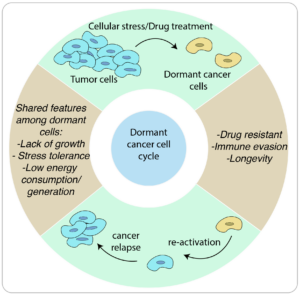REGULATION OF PROTEIN SYNTHESIS IN DORMANT CANCER CELLS LEADING TO METASTASIS
A small subpopulation of tumor cells can evade the immune response by becoming dormant and develops resistance to chemotherapy drugs. This allows some cells to ‘persist’ beyond the course of treatment, leading to cancer resurgence.
Metastatic relapse in cancer patients can be within 2 years after treatment, but in some cases, it can take between 5 to 15 years for cancer to re-appear. DCCs are mostly missed during cancer treatment, as they are not detected by cell proliferation markers usually used in diagnostic settings (2). According to the World Health Organization (WHO) recurrent cancer accounts for most cancer-related deaths worldwide. As such interfering with how cells enter dormancy can have important ramification for new cancer therapies.

Dormancy is quiescent state that exist in all kingdoms of life, including plants, bacteria, fungi and even humans, where a cell stops dividing and remain in this state until re-activated. The process builds stress tolerance and longevity, which gives the cell ability to persist during stress. The lab is particularly interested in understanding the regulatory mechanisms underlying the entry of and exit from the state of dormancy.
Our long-term goal is to reveal how dormant cells utilize their cellular machinery to persist during stress. In cancer, we want to understand how these cells evade immune response and persist during drug treatment. I also aim to reveal new markers that can be used to track dormant cells in tumors.
